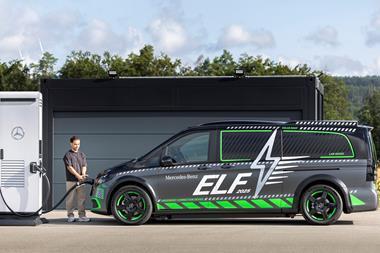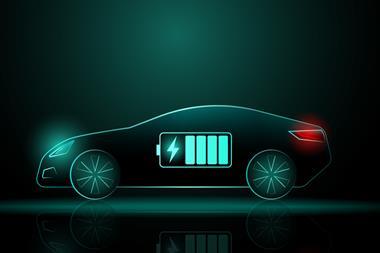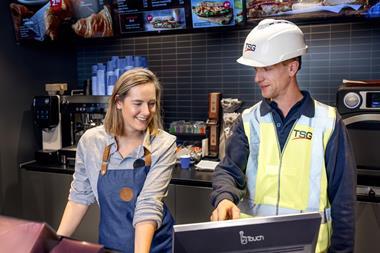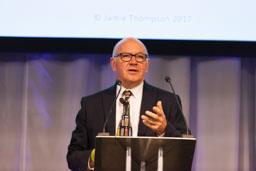If you’re a BP dealer, this summer could be an exciting time for you as BP Chargemaster is starting the roll out of its ultra-fast 150kW electric vehicle (EV) chargers that it expects to be capable of delivering 100 miles of range in just 10 minutes. And the primary focus for the roll out is forecourts. Already BP Chargemaster provides access to over 6,500 charging points on its public charging network, which has more than 50,000 users. However, of those charging points just two are on forecourts legacy units that the company inherited.
The reason the roll out of these new 150kW units is focused on forecourts is the speed in which they deliver the charge.
"This is a very exciting way for forecourts to capture the EV market as with the 150kW chargers, drivers just plug in, go inside for a coffee or to get that night’s dinner, unplug and go," says Tom Callow, director of communication and strategy at BP Chargemaster, who says the company has been communicating with the dealer community and had extremely positive feedback.
"Most forecourts don’t want EVs on their sites for more than 15 minutes, it’s not the way to go. And dealers recognise a higher rate of charge is needed," he says.
"All the EV announcements at the moment are of cars with faster chargers 100kW to 150kW. We want to maximise this potential and getting 100 miles in 10-to-15 minutes is very useful."
The current market standard is the ’rapid’ 50kW, which delivers up to 200 miles of range in an hour. And most pure electric cars today accept a maximum charging speed of 50kW. Callow says BP Chargemaster has the largest network of 50kW chargers today with more than 400 units.
"All EV charging is not the same vehicles can be charged slowly or quickly. It’s all about different speeds for different needs. You could even plug a vehicle into a three-pin socket but of course it’s not designed for that and therefore not ideal. The slowest chargers out there are 3kW, which deliver a range of about 10 miles for every hour a vehicle is plugged in, but that might be okay if it’s plugged in overnight."
Callow says they will deploy the new 150kW units on new sites and currently have no plans to upgrade the existing network because the chargers at those sites suit their dwell time.
"We match the chargers with the locations because you need to have the right infrastructure in the right location."
As for space for the chargers, Callow says a lot of new-to-industry sites have already allocated space for them. "Typically they tend to be larger sites in highly transient locations, with lots of space."
While cars such as the new Audi e-tron are capable of taking a 150kW charge and Tesla vehicles can charge at up to 120kW on their infrastructure, most pure EVs on the road at the moment are not. But Callow says the new chargers are intelligent, they ’talk’ to the car, working out what type of charge the vehicle accepts and reducing the rate accordingly. Simply put, they are backwards compatible so won’t damage the vehicle.
Callow says typical charging costs to the consumer vary but the average is 25-50% of current typical fuelling costs. He adds that if you charge your vehicle more than twice a month then it’s probably best for drivers to take out a subscription with BP Chargemaster where you pay £7.85 a month and then get cheaper electricity. If you charge up less than that, it’s probably best to ’pay as you go’.
Tim Payne CEO of Instavolt, believes that pay-as-you-go charging will become the norm. "InstaVolt turned heads in the industry when it came into the market with its tap-to-pay approach, where drivers simply use their contactless credit or debit card to pay. No subscription, membership card or app is needed. Drivers can even pay with their Apple watch or iPhone.
"It should be simple to charge and we’re already seeing other providers moving towards this approach. The government’s pushing for an easier approach to charging too so I have no doubt this is the way electric charging will go."
logical place
Payne believes forecourts are the logical place to house a national network of rapid chargers, allowing EV drivers to charge up while on journeys.
"Forecourt traders play an even bigger role than I think any of us have given them credit for in this bid to increase use of EVs and, ultimately, improve air quality. EV drivers want the charging experience to be as simple as possible, with easily accessible rapid charging available in convenient locations. Forecourts hold the power to make it just as easy to do so with EVs. They have the potential to become the backbone of ’location charging’, enabling quick top-ups that fit around EV drivers’ lives, boosting range and providing more consumer confidence."
InstaVolt has been focusing on installing its rapid, pay-as-you-go chargers at forecourts, as well as small retail areas and business parks across the UK. Penny Petroleum, Certas and Harvest Energy are just a few of the big names putting their trust in InstaVolt, along with a growing number of Top 50 Indie forecourts and independent providers.
The InstaVolt model means it installs and maintains rapid EV chargers for free. And the company also provides landowners with a rental income for housing the charging stations on their land.
Payne says: "Some businesses we speak to can’t quite get their heads around the idea of us installing chargers for free. We’ve had a few operators initially turn us away because they think it’s too good to be true installing charging points at no cost to the taxpayer.
"We want to reassure fuel retailers that the implications of the Automated & Electric Vehicles Bill needn’t cost them a penny. We can handle everything from obtaining planning permission to upgrading the chargers as technology evolves. What’s more they can actually make a rental income from it."
revenue share
Meanwhile, at Alfa Power the preferred option is that the company pays towards the installation cost and offers a revenue share system. Alfa Power owns the hardware, but if the forecourt owner carries some of the costs they will receive a higher revenue share.
"We are proud to be able to provide publicly accessible rapid charging infrastructure to support the government’s Road to Zero strategy," says Alex Hinchcliffe, managing director of Alfa Power.
"We’re working hard to not only deploy charging infrastructure, but also support the EV industry. What is more, we’re currently the only four-in-one and the only simultaneous CCS and CHAdeMO charge-point provider in the market." For anyone who is not sure, four-in-one refers to the fact that the rapid chargers can simultaneously charge up to four vehicles.
Alfa Power already has a number of EV chargers installed at forecourts across the UK and is keen to rapidly expand this footprint. "Forecourts are pivotal to the success of the Road to Zero roadmap," says Hinchcliffe.
"They are the current port of call for drivers looking to refuel, and they will continue to play that role. Early adoption of EV infrastructure simply puts forecourt traders ahead of the game. Influencing the behaviours of EV owners by establishing your forecourt as a go-to charging destination makes perfect sense. The earlier this is implemented the greater recognition and increased customer loyalty can be expected. The traders with the most forethought in providing appropriate infrastructure for this sector will be better placed to capitalise and can expect a larger share of the existing and future market."
He says getting a charger installed on your forecourt may sound complicated, but it is actually much less of an issue than you might think.
"First we carry out a feasibility study to determine if it is possible to install a charger on the site. Once that is complete, we work closely with the forecourt owner to ensure a mutually viable situation for all parties involved.
"Our model is simple and it maximises the use of the charger and benefits all stakeholders. We hope to continue delivering this superior option to forecourts."
Hinchcliffe says that forecourts with rapid charging infrastructure normally have between two-to-three nominal parking bays for EV charging.
Its Delta rapid charger has a width of 852mm and a height of 2079mm, and this is placed beyond the parking bays, not within the parking bays.
A standard 60kW rapid charger would require a three-phase supply with around 85 amps per phase. The power of the charger is calculated by multiplying the voltage (240v) by the current (85A) which is then multiplied by the number of phases, which will equal 61KVA ( 60kW).
Where the electricity is provided by the forecourt, Alfa Power will reconcile the amount used by the charger.
The unit rate will be negotiated between Alfa Power and the landowner.
Certas Energy chooses InstaVolt
When Certas Energy sought to roll out electric vehicle (EV) chargers at its forecourts across the country, it decided to pair with one of the UK’s leading providers of rapid chargers, InstaVolt.
Gerry Welsh, retail marketing manager for Certas Energy, says: "As sales of electric cars increase, we have been mindful to evolve and add to our offering in response. We decided to look into installing electric car chargers at our forecourts and chose to partner with InstaVolt, because of its expertise, the flexibility of the deal and the company’s proven ability to evolve with this rapidly advancing technology.
"It was important for us to choose an innovative solution that would work long into the future. The InstaVolt chargers that are being installed at our sites can be updated as battery technology evolves, delivering faster rates of charge as new technology demands it. This ensures sites such as Gulf Aikenhead Road retain best-in-class hardware.
"Another reason to choose InstaVolt was because it offered the simplest and most transparent approach to charging. We want our customers to have an easy and enjoyable experience while with us, and InstaVolt’s solution does just that."
Unlike many other charging stations, drivers don’t need a membership, card or subscription. They simply turn up, tap their contactless credit or debit card, charge up and go. The chargers are easy to use and there’s a freephone support line should customers need help. Certas started working with InstaVolt in 2018 and its Gulf forecourts are already reaping the benefits.
EV news
According to the Society of Motor Manufacturers and Traders (SMMT) latest figures, the appetite for alternatively fuelled vehicles grew 26.3% in January, resulting in a total 6.8% market share. The performance supports the latest forecast for this sector, currently expected to rise more than a quarter by the end of 2019 to around 177,000 units. Some 86,000 of these cars are set to be ultra low-emission plug-in hybrids and battery electrics taking plug-in market share to around 3.7% as an ever-increasing number of models come on sale.
A study by the International Council for Clean Transportation (ICCT), has found that electric cars are cheaper to own and run than petrol or diesels in the UK. The study examined the purchase, fuel and tax costs of the VW golf, in its battery electric, hybrid, petrol and diesel versions across five European countries. Over four years, the pure electric version was the cheapest in all places including the UK.
Volkswagen Group has joined forces with Tesco in plans for a network of 2,400 chargers across 600 stores, powered by Pod Point, within the next three years. The charging bays will be based in Tesco Extra and Superstore car parks throughout the UK.
ChargePoint partners with MFG
ChargePoint Services (CPS) and number one in the Top 50 Indies list, MFG, have been working in partnership to roll out electric vehicle (EV) rapid charging nationwide across MFG forecourts.
CPS says planning and designing the installation is the most difficult element of any EV charge point filling station deployment. Installing on a forecourt comes with the expected inherent issues and obstacles that must be addressed and risks that must be mitigated, but CPS has an expert in-house deployment team, which is well versed with the Blue Book regs, as well as the wiring regs and associated code of practice. But, after taking into account the hazardous zones, more often than not, there is very little actual usable space remaining on the forecourt for a fully technical compliant EVCP installation.
For those sites that do get a GeniePoint, signage is installed to highlight it. In addition, there are already thousands of EV drivers registered on the GeniePoint network, and as soon as a new charger goes live, drivers are notified via the TorquePoint newsletter, social media and press coverage.
The new charger immediately appears on the map on the GeniePoint mobile website www.geniepoint.co.uk.
Using the public GeniePoint Network costs 30p per kilowatt hour with a £1 connection fee. There’s a calculator on the ChargePoint website to show drivers how fast it will take to charge their vehicle, obviously depending on a variety of conditions battery capacity, how much charge is left in the battery, etc.

































No comments yet